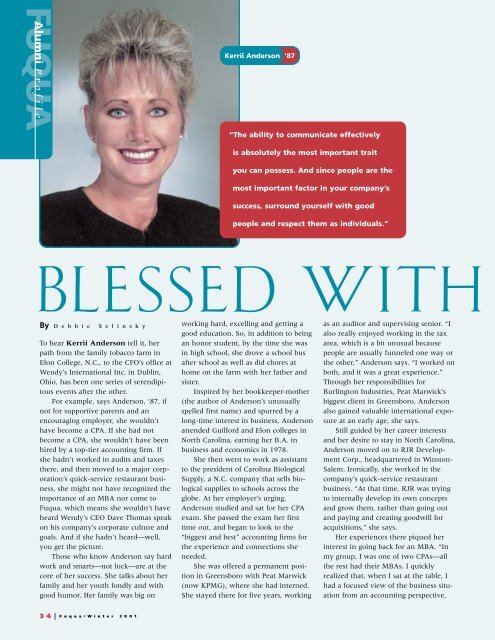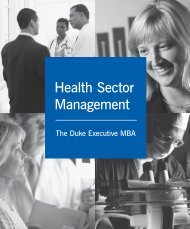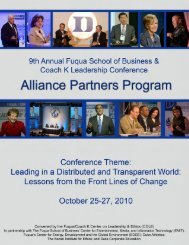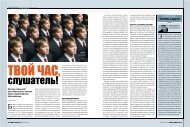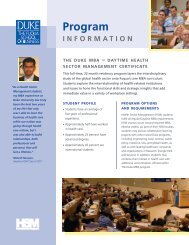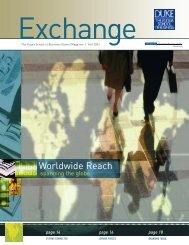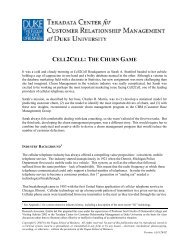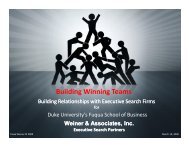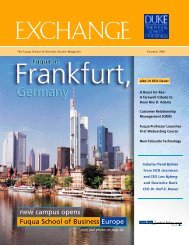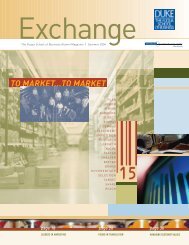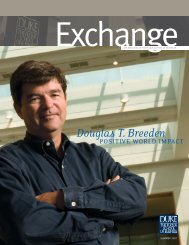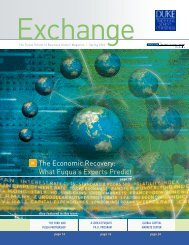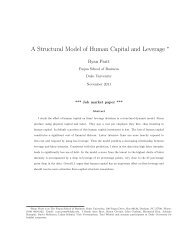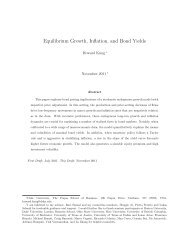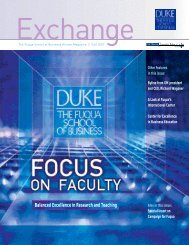A l u m n i M a g a z i n e - Duke University's Fuqua School of Business
A l u m n i M a g a z i n e - Duke University's Fuqua School of Business
A l u m n i M a g a z i n e - Duke University's Fuqua School of Business
Create successful ePaper yourself
Turn your PDF publications into a flip-book with our unique Google optimized e-Paper software.
lessed<br />
FUQUA<br />
Alumni Pr<strong>of</strong>ile with<br />
By D e b b i e S e l i n s k y<br />
To hear Kerrii Anderson tell it, her<br />
path from the family tobacco farm in<br />
Elon College, N.C., to the CFO’s <strong>of</strong>fice at<br />
Wendy’s International Inc. in Dublin,<br />
Ohio, has been one series <strong>of</strong> serendipitous<br />
events after the other.<br />
For example, says Anderson, ‘87, if<br />
not for supportive parents and an<br />
encouraging employer, she wouldn’t<br />
have become a CPA. If she had not<br />
become a CPA, she wouldn’t have been<br />
hired by a top-tier accounting firm. If<br />
she hadn’t worked in audits and taxes<br />
there, and then moved to a major corporation’s<br />
quick-service restaurant business,<br />
she might not have recognized the<br />
importance <strong>of</strong> an MBA nor come to<br />
<strong>Fuqua</strong>, which means she wouldn’t have<br />
heard Wendy’s CEO Dave Thomas speak<br />
on his company’s corporate culture and<br />
goals. And if she hadn’t heard—well,<br />
you get the picture.<br />
Those who know Anderson say hard<br />
work and smarts—not luck—are at the<br />
core <strong>of</strong> her success. She talks about her<br />
family and her youth fondly and with<br />
good humor. Her family was big on<br />
34I F u q u a / W i n t e r 2 0 0 1<br />
Kerrii Anderson ’87<br />
“The ability to communicate effectively<br />
is absolutely the most important trait<br />
you can possess. And since people are the<br />
most important factor in your company’s<br />
success, surround yourself with good<br />
people and respect them as individuals.”<br />
working hard, excelling and getting a<br />
good education. So, in addition to being<br />
an honor student, by the time she was<br />
in high school, she drove a school bus<br />
after school as well as did chores at<br />
home on the farm with her father and<br />
sister.<br />
Inspired by her bookkeeper-mother<br />
(the author <strong>of</strong> Anderson’s unusually<br />
spelled first name) and spurred by a<br />
long-time interest in business, Anderson<br />
attended Guilford and Elon colleges in<br />
North Carolina, earning her B.A. in<br />
business and economics in 1978.<br />
She then went to work as assistant<br />
to the president <strong>of</strong> Carolina Biological<br />
Supply, a N.C. company that sells biological<br />
supplies to schools across the<br />
globe. At her employer’s urging,<br />
Anderson studied and sat for her CPA<br />
exam. She passed the exam her first<br />
time out, and began to look to the<br />
“biggest and best” accounting firms for<br />
the experience and connections she<br />
needed.<br />
She was <strong>of</strong>fered a permanent position<br />
in Greensboro with Peat Marwick<br />
(now KPMG), where she had interned.<br />
She stayed there for five years, working<br />
as an auditor and supervising senior. “I<br />
also really enjoyed working in the tax<br />
area, which is a bit unusual because<br />
people are usually funneled one way or<br />
the other,” Anderson says. “I worked on<br />
both, and it was a great experience.”<br />
Through her responsibilities for<br />
Burlington Industries, Peat Marwick’s<br />
biggest client in Greensboro, Anderson<br />
also gained valuable international exposure<br />
at an early age, she says.<br />
Still guided by her career interests<br />
and her desire to stay in North Carolina,<br />
Anderson moved on to RJR Development<br />
Corp., headquartered in Winston-<br />
Salem. Ironically, she worked in the<br />
company’s quick-service restaurant<br />
business. “At that time, RJR was trying<br />
to internally develop its own concepts<br />
and grow them, rather than going out<br />
and paying and creating goodwill for<br />
acquisitions,” she says.<br />
Her experiences there piqued her<br />
interest in going back for an MBA. “In<br />
my group, I was one <strong>of</strong> two CPAs—all<br />
the rest had their MBAs. I quickly<br />
realized that, when I sat at the table, I<br />
had a focused view <strong>of</strong> the business situation<br />
from an accounting perspective,


